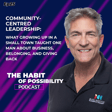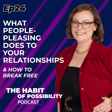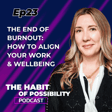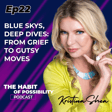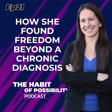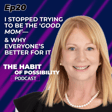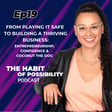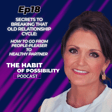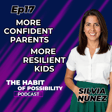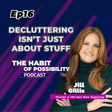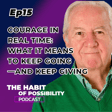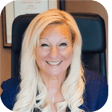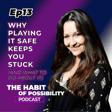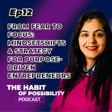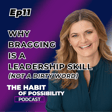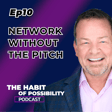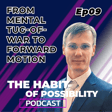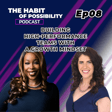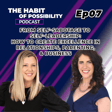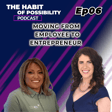Become a Creator today!Start creating today - Share your story with the world!
Start for free
00:00:00
00:00:01

3 Secrets for Building Resilience & Avoiding Burning Out in the Face of Unexpected Change
Discover:
- The importance of harmonizing with yourself and others
- Tips for resilience in the face of change you didn’t choose
- Healthy ways to pace yourself through life and work
You can connect with Sharon Summerfield at www.nourishedexecutive.ca.
Learn more about how Robbie Spier Miller can help you build your business and personal success here:
https://www.hypnosistrainingcanada.com
https://www.mindlinkconsulting.com
Social Media Handles:
@hypnosistrainingcanada
@robbiespiermiller
Transcript
Introduction to the Habit of Possibility
00:00:00
Speaker
I could do things at the ninth hour before the accident. I can't do that now. Learning to listen to your body, but it's also challenging because people expect you to show up the same way, but you've changed.
00:00:12
Speaker
Your life, it's been disrupted. You have to find a different way forward. Welcome to the Habit of Possibility podcast, the show about turning obstacles into opportunities.
00:00:23
Speaker
I'm your host, Robbie Spearmiller. Today, we are sharing ideas for how to be resilient and avoid burnout in the face of unexpected changes and develop ways to harmonize with our new reality.
00:00:35
Speaker
Our
Sharon's Injury and Recovery Journey
00:00:36
Speaker
guest, Sharon Summerfield, shares with us her story about how an injury disrupted her life, how she coped, and the gifts she discovered along the way. Sharon is the founder of the Nourished Executive and helps leaders invest in their well-being with the goal of preventing burnout and building a healthy lifestyle.
00:00:55
Speaker
Today, I'm really looking forward to this conversation with our guest. Her name is Sharon Summerfield, and she's had some very interesting shifts in her life that that she's used to really benefit her future and become more connected with what she really wants.
00:01:13
Speaker
So i would like to just start having a conversation so she can share with you what that, how that happened for her and any insights or wisdom she might have for you around facing challenges in your life.
00:01:25
Speaker
Welcome, Sharon. Great to be here with you, Robbie. looking forward to our conversation. Me too. So why don't you start by sharing a little bit about, you know, what sparked this? I know you made a big change in your life and you were facing some challenges. So, you know, tell us about that. Where did, how did that start? What was that like for you so that we can see where you're coming from?
00:01:49
Speaker
I'd be
Career Transition and Burnout
00:01:50
Speaker
pleased to. So it's, you know, it's been an interesting journey. So um for many years, actually several decades, I worked as an executive assistant and got involved in project management and managed a lot of events and conferences and meetings and worked with with many, many very talented executives. and And one point I was working for a global engineering firm and i had an organizational role, a project role, and I was leading a community investment initiative off the side of my desk.
00:02:24
Speaker
And I had a three hour commute. And it was at that point I really realized um for those in the project management space, they'll understand the project, um project the scope creep, you know, where you take on, you know, we're just going to do a little bit here and then it kind of goes a little bit further. Well, I i came to this realization I had too much on my plate and I had read this article by Brian Fraser, who used to have a company where he compared jazz to leadership. He's um he's a leadership coach, but he's also a pastor. um When my husband and I got married, he married us.
00:03:00
Speaker
And, but he had this newsletter and then it talked about consider who you can best harmonize with. And this idea of work-life balance had been, and never resonated with me.
00:03:12
Speaker
And so looking at who I could best harmonize with, I started looking at what I would say no to. And, um and so that, that was the beginning of because i was experiencing some symptoms of burnout, you know, and and I couldn't get a lot of answers to things. So it was it was by learning to say yes to myself.
00:03:32
Speaker
that I could find those different ways forward. So
Pursuing Holistic Nutrition and Facing New Challenges
00:03:35
Speaker
when my project role came to an end, I was laid off from the organization I was with, and I'd always been looking at programs in holistic nutrition, not so much the food piece, because I had a really good handle on that, but I was really interested in the intersection with the body, mind, and spirit, and the piece of stress, because it doesn't matter how well you're eating.
00:03:55
Speaker
If you don't manage your stress in a different way, your your body can't actually absorb all the nutrients. like your Your body doesn't function as it's supposed to be. So I was out of work for nine months and then joined Electronic Health Project where I was going to school at the Canadian School of Mountain to Nutrition at the same time.
00:04:15
Speaker
and was on that project till I finished my my program. And while I was there, i actually got sick from air quality in the, in the, this is healthcare, in the project office.
00:04:28
Speaker
And it turned out, it took months and months for them to figure what was going on and everyone was getting sick. um that they'd actually installed the fans the wrong way. And there were some some some other issues.
00:04:40
Speaker
So I finished my nutrition program and then took go went to go work with a friend at the Canadian Cancer Society. And it wasn't working crazy hours. There was no expectation of crazy hours. We're having conversations about, you know, caring about our people.
00:04:54
Speaker
Are people, you know, are they able to work in their strength zones? Are they working too much? Are we seeing emails at two o'clock in the morning? um And so I ended up doing coaching when I was there.
00:05:07
Speaker
I was asked to be a member of the Health and Safety Committee and then, sadly, um we were leaving the lake. My husband's had a a cabinet in off-grid lake here in BC, Vancouver Island for several decades.
00:05:22
Speaker
And
Motorcycle Accident and Recovery Start
00:05:23
Speaker
I fell off his motorcycle and I injured my right side. um That injury still plagues me. We're still trying to get diagnostics. So what I ended up doing is first, you know, tried to go see my doctor, know, I had to actually get back on the motorcycle to go to emergency and then get back on the motorcycle to get back to Vancouver because we had to take a ferry to get home.
00:05:45
Speaker
And, um, I ended up, I do not recommend this, um I had to drive across a bridge to go see my doctor and didn't realize to the depths of the injury. We didn't realize at that point I'd fractured my ribs. We didn't understand about the soft tissue damage.
00:06:02
Speaker
So I saw her and she's like, you're not driving for six weeks and you're not using your hand for six weeks. Well, my driving actually it was for, not driving was for six months. And i started working with my physio and I'm like, well,
00:06:16
Speaker
I want to get back to Pilates. She's like, we got to get you driving first. um So then we introduced one-on-one Pilates, we introduced massage, we introduced lymphatic drainage, but everyone had to be willing to work with my physio Clara in Vancouver.
00:06:30
Speaker
Not everybody was. So if they weren't, they couldn't be part of what I call Project Me and Clara being the project director of Project Me. So, you know, we're going along building the team, I'm getting stronger. i mean, initially my arm was like this and my hand was in this ball.
00:06:49
Speaker
So all these different rehabs and, um you know, all the different exercises, all the different practitioners, they all had a different lens and it was incredibly beautiful. They've all become dear friends.
00:07:04
Speaker
So, you know, four years after that accident,
Second Injury and Building a New Rehab Team
00:07:08
Speaker
I'm at the cabin again. I've had a huge level of anxiety because of the fall. So I was so scared of falling again.
00:07:16
Speaker
And I've been cleaning up Arbutus leaves because Arbutus trees are beautiful. um i don't know if you have them in Ontario, but we have them in... I've never heard of them. so Oh, they're stunning.
00:07:28
Speaker
But there's a problem with them. Their leaves don't break down as quickly as other leaves do. And so they'll layer on top of each other. So I was really afraid someone was going to fall. And my parents, who were in their 80s, were coming to the cabin. had a couple of sisters.
00:07:43
Speaker
And some other friends were were coming for a visit. So I'd been cleaning them up for weeks. So the day after my 60th birthday, I went to climb up this little hill. We have a little lending library, you know, those little community libraries, which I think are just beautiful.
00:07:59
Speaker
Like the four ones where you open the little... Yeah. man and yeah Oh, yeah, we have one in our neighborhood. Yeah, I love them. So I, i you know, I've taken a couple of books and I wanted to put some more books in there. So i went up this little hill and I started to slip.
00:08:14
Speaker
And then I fell and um ended up having to get rushed first to Courtney Hospital and then Campbell River Hospital for an emergency hip replacement. And um so it was, you know, I'm not starting from square one. I've got my rehab team um for my right
Rehabilitation Through Daily Activities
00:08:34
Speaker
side.
00:08:35
Speaker
Now I need to build a rehab team for my left. it was beautiful that you know i could get some of the same people involved but a month after my accident my beautiful physio in vancouver clara actually was hit by a car riding her bike in the bike lane by vancouver airport oh my god yeah and so she's she's still you know it's it's it's injury isn't isn't easy but it's sometimes it's by sharing our stories and sharing what we learn um along the way but we actually inspire others.
00:09:09
Speaker
um And one of the things Clara had me do was I had to learn to type again. i I had exercises like I'm gonna write a card a day. I'm going to wear pants with a zipper once a week.
00:09:22
Speaker
oh um ah So it's all those. and So one of the recipes, one of her exercises was to take a recipe, make it more nutrient dense using different tools in the kitchen because I i couldn't, I mean, one thing was,
00:09:39
Speaker
it took me six months to chop a cucumber. And you think about that's not, cucumber is not very dense. And so that became an exercise that became something.
00:09:51
Speaker
i started making all these different, different recipes, but using fundamentally different tools. So actually next weekend, doing workshop um on navigating the holidays with food sensitivities. And I'm going to feature a number of the recipes that I've created.
00:10:10
Speaker
Ah, great. Well, you're speaking my language because i I'm a foodie, so. Oh, that's great. It's great. yeah And so, like, everything has become like a rehab exercise.
00:10:23
Speaker
Like, sending an email is a rehab exercise. For my team that I work with, my grandma used to make these exercises. these wreaths that were made out candies.
00:10:36
Speaker
So that's a rehab exercise. I can't do like three or four in a day. I might be able to do one and because I'm tying each little, and I don't use the curve candies that grandma used. We're gonna have something on that. Let's have truffles.
00:10:50
Speaker
um so So, you know, it's, and they all look forward to it each year. Actually, it's quite funny, actually. They're like, oh, do we get another wreath? So it's it's those little things. And I started, of course, reading a lot more and um was introduced to the but the work of so many beautiful people.
00:11:13
Speaker
And I remember i had, I discovered Marcus Buckingham's work ah about 15 years ago.
Smart Growth Certification and Embracing Constraints
00:11:19
Speaker
um when i read it can't remember which um which book it was um and and he ended up doing this podcast with whitney johnson and then i just started discovering whitney's work and Her podcast, Disrupt Yourself, became like this oxygen of hope for me. And I was introduced to all these amazing authors and thought leaders.
00:11:48
Speaker
And then after after I broke my hip, her team started reaching out to me and invited me to do their smart growth certification. And part of that is looking at your growth accelerants, which I've been living for four years.
00:12:03
Speaker
You know, how can I step back to grow? How can i embrace my constraints? And so it was just like, it was like, it was speaking my language. Mm-hmm.
00:12:14
Speaker
Yeah, yeah. Wow. So you really had your life thrown up in the air because the way you were living before you couldn't keep living and nature was forcing you to do what you needed to do to recover or adopt your life. And so it must have been a big growing experience for you as a person that had some really great things. And it sounds like you discovered a lot of wonderful things and added things to your life.
00:12:42
Speaker
And it probably had some really challenging things. Would you say that? Yeah, it did. ah That's true. Yeah. It did.
Accepting New Reality and Maximizing Resources
00:12:48
Speaker
And it's recently I've written um um three articles with Shavisa Forsman. I met her on LinkedIn.
00:12:56
Speaker
And about recovery, about the role of Pilates in osteopaths, about that yeah being vulnerable and, you know, sitting... sitting with what's going on And it was really hard for me to lose my identity as an executive assistant.
00:13:14
Speaker
I had a plan. I was finally working in an organization with a friend. We were, you know, really finding those ways to lift and empower people. I remember um when I was there, there was someone I learned that she'd come but she'd had day surgery and came back to the office because there was no one to fill in.
00:13:34
Speaker
at that point, the organization had volunteers on reception. and and and I remember going to Aaron and saying, we've got to do something. We need to do something. Maybe we can be creative. Maybe we you know we're talking about you know lots of times, there's lots of really ways we can be creative. It doesn't have to be ah full-time role. Maybe you create part-time roles. Maybe you bring in working moms.
00:13:56
Speaker
Maybe you you attract people that want to get into fundraising or different areas of the business. And I remember it was about, was about six or eight months after the injury and we we would get together for, for tea. mean, because we were friends long before we, I went to go work with her.
00:14:14
Speaker
And she's like, Sharon, it's been approved um that we're going to create full-time role. We're going be creative. We're going to do something. And it's like, it's those sorts of things. So I've had a number of those conversations with the injury.
00:14:28
Speaker
um because you know like did work as an admin professional for so many years so my lens on a lot of things is really different and I've really learned about and held on to that strong planning tool for me it becomes yeah, I can do things at the... I could do things at the ninth hour before the accident. I can't do that now.
00:14:53
Speaker
um And but so it's like really listening and learning to listen to your body. But it's also challenging because people expect you to show up the same way.
00:15:07
Speaker
And it's... But you've changed because your life... it's been disrupted and you have to find a different way forward. For sure, yeah.
00:15:18
Speaker
And so it's so interesting because we have a lot of people who come for hypnosis training and some of them are coming for things like, let's say, weight loss, where just about every weight loss client, they want to have lost the weight like yesterday, um right? Which you can understand.
00:15:34
Speaker
But a lot of the the the developing that lifestyle that can support long-term health and fitness is, is about being willing to stay with things over time and to practice just the way you practice to your rehab, and to practice living the way you need to live to to be healthy and fit.
00:15:55
Speaker
Or we have people who are business owners or who want to build a business and they want it done like now, or they want every little thing they do to work beautifully. And a lot of it is trial and error and the willingness to stay with that and keep focused on the vision and be creative and be flexible enough to do what it takes to get the outcome.
00:16:17
Speaker
So for you, you have this big picture outcome of rebuilding your life and finding a way to navigate life in a way that's satisfying and that you can contribute and that works for your body.
00:16:29
Speaker
um And I think many people have, you know, different versions of this, whether they're having a physical challenge or an emotional challenge or a financial or business challenge or learning growth challenge, um that it's a really great real life example of how nature holds us accountable to to change in human time.
00:16:50
Speaker
and to grow ourselves in a way that nature allows. And so I think a big skill or a big muscle we build here with hypnosis is helping people learn how to do that.
00:17:01
Speaker
And for you, Sharon, because you you didn't have a choice, physically you didn't have a choice, You had to do it. I'm sure you can see examples in your life before this happened where you did have a choice and maybe something needed to change, but you were relying on your old way of doing things or what your personal preferences were instead of doing what works better.
00:17:24
Speaker
um Can you think of some examples of where you might have done that? Um, you know, i think i think for a long time, you know, it was always, you know, it needs to be done, so therefore it will be.
00:17:36
Speaker
And um that was something I really, really learned, um you know, after I was laid out from the engineering firm. I was used to making things happen. You know, I'd been working with big teams, and it was it was actually amazing what well we we made happen.
00:17:52
Speaker
And then i went to go work on an electronic health project. And, you know, going from construction and engineering to to health care, ah you know, I'd worked on big projects before. um ah Health care is is is having a hard time.
00:18:12
Speaker
um And I was used to teams that were used to working together. Like when I worked, the last big project I worked on um was the South Fraser Perimeter Road. So if you, it's kind of like the size of Metrolinx in Ontario.
00:18:26
Speaker
And then when I went to go work on an electronic health project, um which is around, was around a little smaller. um But in an engineering construction, we were used to working like that.
00:18:37
Speaker
we when you When you talk about you know building teams, you know the the storming stage, on the engineering construction projects, I was part of, storming stage didn't last very long.
00:18:48
Speaker
We went from storming to norming and performing really quickly. When I was on the healthcare care project for three years, we never got out of storming. um And so it was, and one of the things I had to really learn was that I can't make things happen all costs because sometimes there's a reason why things aren't working. And that was one thing I actually learned in the in the engineering firm is you you know, um as an executive assistant, at one point I was was um working with two so senior leaders, one with global responsibilities and one with
00:19:27
Speaker
and national responsibilities across Canada. And, um you know, I learned to watch the emails kind of do the flurry, wait them so to slow down, and then and then, you know, could take the action that that was needed. But it was, you know, everyone's like, we just noticed that you just kind of you don't react, you just wait, well healthcare, everything is a reaction.
00:19:53
Speaker
And I had to learn that I couldn't make things happen at all costs. And so and i had to learn to celebrate that I have done the best job i could with the tools and resources I had available.
00:20:08
Speaker
And so we actually started this conversation um because there was a huge problem with IT support. um And we started this conversation of actually documenting when support requests were put in, things that needed to be done, and some of these tickets were never resolved.
00:20:26
Speaker
And I remember in the middle of this, i just thought, I just have to send the MIT people that I worked with um when I was at the engineering firm and on the project, I sent it all three of them. And I'm like, I always thought you guys were great, but I think you walk on water now.
00:20:39
Speaker
um And what was interesting is going through that process of the documentation, other people got involved And um the director of communications said, you guys have been doing this for a long time.
00:20:52
Speaker
i'm I'm getting other people involved. Well, it turned out we didn't have the infrastructure that we needed to do what to do what was being asked about. We just didn't have, and and they needed to do some upgrading and all this other kind stuff.
00:21:06
Speaker
But it was ah really good lesson to learn for me, to continue continue to learn that lesson is sometimes we We need to celebrate that sometimes doing the best we can is all we can do. I'm not talking about dropping the ball. I'm not talking about um doing the bare minimum.
00:21:28
Speaker
I'm talking about performing, but learning that this is all we can do right now. We've
Relearning and Adapting Through Challenges
00:21:35
Speaker
exhausted all the possibilities. Like with my with my injury, you know, it was when I started Pilates.
00:21:43
Speaker
um She had to put her hand underneath my shoulder blade, lift it up into position so I could actually do some of the exercises to get those stabilizing muscles starting to learn to do their job again. And it really was learning to learn again. And I think those lessons are really important. i think we need to pay attention to them.
00:22:04
Speaker
Yeah, yeah. And I think that the big, really valuable message of sharing here is that you, when you were working at an engineering firm, you were on these teams and they functioned well and you were used to making things happen.
00:22:18
Speaker
And you started when you had these other experiences, whether it was with the injury or working with that other team, where you were, you realized, wow, I'm in a situation where I don't have that kind of control.
00:22:30
Speaker
And so you discovered what it means to know you're okay anyway and do what you can do and and learn from that and be creative with that. and and And sometimes people find it ah really crushes their spirit when they're in those kinds of situations.
00:22:47
Speaker
um and It can. Yeah, yeah. So so you you found a way to make it meaningful and valuable anyway. And I think some of this is also if we if we stand back and see the picture in a bigger and bigger fashion, then we can see there's always a bigger game being played than the one we think is being played.
00:23:06
Speaker
So it's easier to value other things than maybe what's immediately in front of us. Does that make sense? Yeah. Yeah, it does.
Identity Loss and Body Awareness
00:23:15
Speaker
It does. It's, you know, over the the last six years have not been easy. And and I remember a year after the accident, like i figured I'd be maybe off work for a week or two.
00:23:25
Speaker
And when the first one was six weeks and then, you know, my hand ballooned for three years. And I remember a year after the accident, having in conversation with my doctor, she's like you will never be able to go back to do the work that you've done.
00:23:41
Speaker
you did before. And, you know, over the last six years, I've taken on volunteer roles. One was on a council with Estrada the lake and another one was on the Board of Trade, you mimicked some of those things that I used to do. And I've had to resign in both cases because I physically can't you know do it. And it's I think it's really a big continual learning is just because I know how to do something doesn't mean I need to be the person that does it.
00:24:12
Speaker
And I need to listen to my body because, you know, if I'm, you know, i'm I'm working on a women's health conference and I just do a little bits each day. If I do too much, um when I need to take a break, I'm not taking a break for five or 10 minutes. I'm taking a break for two or three hours.
00:24:31
Speaker
Yeah. And I think it's that piece is so important. And the work that you do with the hypnosis, like that that is that is so incredibly important.
00:24:43
Speaker
And one
Breath Work and Meditation for Pain Management
00:24:44
Speaker
of the things discovered, I think it was two years after the accident, I'd been using breath work during my help manage pain. i had done a a meditation c class, a transcendental meditation class in Vancouver, and um that about three months before the accident happened.
00:25:04
Speaker
So would actually use meditation to deal with the pain. um i would use it, and then I learned a little bit more about breath work, and then I actually did a five-day breath work course through Yoga Body.
00:25:18
Speaker
And it was like, it was so incredibly powerful to learn more about those tools I was already using, but understand them a little bit better. Mm-hmm.
00:25:31
Speaker
Yeah. Because we don't necessarily, um and that's why I ran into a bit of, um wasn't on the same page as my doctor because she was always trying to prescribe medications, like painkillers. I'm like, well, Tylenol, you know, Tylenol-3 don't get along very well.
00:25:48
Speaker
So I found topical creams that had Arnica and a natural pain reliever in it. And, you know, used topical um castor oil, breath work, meditation,
00:26:01
Speaker
um Ice. Ice is my friend. Cold water. But all those sorts of things, instead you know, if I take painkiller, I'm going to deal with more...
00:26:14
Speaker
i'm going to deal with more problems from taking that. So I found these other options and what you do um must be so beneficial to your clients.
00:26:26
Speaker
Yeah. Well, all of that this whole conversation is reminding me of a lot of athletes I've worked with and and there are times when I have athletes who come for help with hypnosis.
00:26:36
Speaker
And they they initially come for sports performance because they're hitting a wall. Maybe they've lost their their confidence because, um you know, something didn't go well in a certain situation or they had an injury or something.
00:26:51
Speaker
And so they're usually coming to learn how to get in their zone as an athlete, which hypnosis is wonderful for. And often what is going on beneath all that is that they've attached their sense of self-worth to their performance.
00:27:05
Speaker
I've worked with athletes who've gotten full scholarships to US colleges, which are worth, you know, 50 or $80,000 a year. and And the minute they get an injury, they're off the team and they lose the scholarship.
00:27:17
Speaker
And if they're not from the US, they have to leave the country. So I've worked with athletes who are in that situation and in in it can really wreck their sense of self-worth because if they're that high performing, their whole life has been about the sport and excelling and they can't anymore, right? They have the injury, the injury changes what they can do.
00:27:39
Speaker
And I think it's a really good um example of how in a way we're all athletes. We all have certain talents or things that we rely on to prop ourselves up.
00:27:50
Speaker
And the more we can free ourselves from that, the the the better things go and the more we're freed up to have choices and see the big picture ah life and respond in a way that's wiser and more sync with ourselves.
00:28:08
Speaker
Oh,
Self-Worth Beyond Physical Abilities and Hypnosis
00:28:09
Speaker
definitely. Yeah. and And that's really the the message I'm getting from you is that, it's you know, with hypnosis, we can talk about this. But when you communicate subconsciously, the subconscious mind can discover new choices that rationally we we we we can understand them, but we don't really know what that means.
00:28:29
Speaker
And so I think there are a lot of people who can benefit from the the maturity and the skills you got from these experiences without necessarily having to have the experience of, right? I don't encourage that.
00:28:41
Speaker
Right. I don't encourage that. We don't want to have to have an accident to discover these things. So you know I'm hoping that some people who are listening can learn through osmosis um you know from these examples. so that and and if you do need help and feedback to truly discover what it means to know you're OK, even if whatever your talents or skills or the things that you've been relying on fall apart.
00:29:08
Speaker
um that you can still know you're okay. And and it's a it's a a thing that we need to experience. We can't, just talking about it isn't going to do it. So I do a lot of work like that with with the clients and the students who come here. so you know, there's a lot of dovetailing of your experiences. Yeah.
00:29:29
Speaker
People have here.
Conclusion and Listener Engagement
00:29:31
Speaker
You can connect with Sharon Summerfield at www.nourishedexecutive.ca. Let us know what you think of the show. Reach out to us at mindlinkconsulting.com. And if you like this show, please rate and review us so other people can find us too.
00:29:48
Speaker
Thanks so much for tuning in. I'm Robbie Spearmiller, the host of the Habit of Possibility podcast. Tune in next time to learn more about how you can turn obstacles into opportunities and make the most of your life and career.
00:30:00
Speaker
And if you're interested in connecting with me and learning about personal and business coaching, consulting, and training opportunities, go to mindlinkconsulting.com or hypnosistrainingcanada.com and schedule your free consultation.
